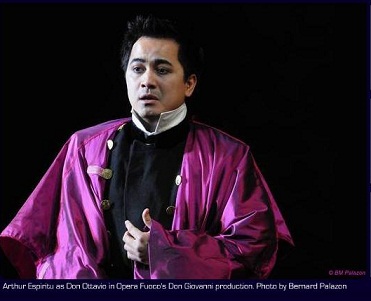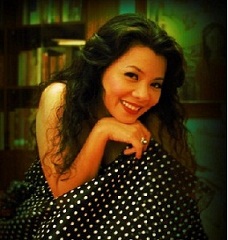By PABLO A. TARIMAN,VERA Files
full-length Barber of Seville by Rossini opens at the CCP Friday night until Saturday with opera lovers focused on the Count Almaviva of Arthur Espiritu who is the first Filipino tenor to sing at La Scala di Milan.
With soprano Rachelle Gerodias as Rosina, Barber of Seville is the first comic opera seen at the CCP after more than a decade. The less-heralded Don Giovanni by Mozart staged at the CCP in the mid-90s would have been a good introduction to the genre. But as it turned out, Don Giovanni had some opera lovers walking out even before the opera’s last arias were heard.
All eyes of course will also be on the PPO ex-music director, Ruggero Barbieri who figured in an earlier Puccini’s Madama Butterfly at the CCP, followed by Don Giovanni (1999) and Il Trovatore in Singapore (2001)
Meanwhile, tenor Espiritu flew in four days before opening night after singing Ernesto in Donizetti’s Don Pasquale in Germany. The real trooper that he is, he was in high spirit even as he will never get to sing his last-act aria, Cessa di piu resistere, for one reason or another. Opera veteran Joseph Uy said Espiritu’s version of the last act tenor aria sang in previous Philamlife concert was in fact better than the version of another noted tenor, Juan Diego Florez, a known Rossini specialist.
Even as he was deep in the the world of classical music, Espiritu keeps abreast with happenings in pop music. During the Jessica Sanchez fever blown up by American Idol, Espiritu was actually rooting for the Filipino-Mexican singing talent. “I was very interested in Jessica Sanchez being able to reach this stage at the age of 16. I think she is very talented and deserves all the support. I just think that she has an amazing talent and she’s able to sing with ease and feeling. Her temperament is just great,” he revealed.
Before he discovered opera, Espiritu was hooked on 90’s alternative rock, some NSync, Ballads, and some Bonjovi, Dream Theater and U2, his favorite bands. “I really like all kinds of music. I am not one person who would limit my taste of music to only one genre. I like the idea of variety,” he said.
Now for this latest Rossini challenge, the tenor knows the danger spots of the opera. “First, you have to be able to sing both legato and florid fiorituri. You open the opera with an aria with a small recitative section, then you sing the aria ‘Ecco ridente in cielo’ (Here smiles the heavens?). Not only you need to sing this aria with great feeling and sensitivity, but you have to sing it with a well honed legato on the first section, then you sing coloratura on the second section culminating in a high C.
Then you have to sing a duet with Figaro, and this involves a lot of energy. It will test your limits within the break of your voice. And throughout the opera, you are involved in most of the scene not to mention the fact that you are playing multiple characters.”
On the other hand, Gerodias first sang Rosina at the Daegu Opera House in Korea on the occasion of the 8th Daegu International Opera Festival two years ago. It was the soprano’s last vocal challenge after her Susanna (Marriage of Figaro) in Singapore a few years ago. She sang her first Violetta at the CCP a few months back.
Looking back, Gerodias had only two months to prepare for the role of her first Barber of Seville in Korea.
Gerodias said,“The only time I really sat in front of the piano with a newly ordered Ricordi score of Barbieri was after Arthur (Espiritu) had left Manila. That left me only five more weeks to prepare for Barber before I flew to Korea. Aware of these challenges, I thought what the heck: it is a great opportunity to learn Rosina and to perform it for the first time in Korea! I want to represent our country in this prestigious festival so I said yes.”
The big challenge then was for her to get into the part of Rosina into her vocal range. “I have been singing a lot of Puccini these past two years and Rossini is a very different style. The composer’s work is the peak of the Italian bel canto style. His writing is very special. He is famous for the difficult coloraturi passages which require a lot of agility in the voice. If you are not trained well for coloratura, then it is very difficult. Now I am actually very pleased that I did this because I am forced to work on my coloratura which is very healthy for a singer.”
She admitted that at first it was a painful and tedious process getting her voice into the music. But after a few weeks of regular training and immersion with Rossini, she became more confident. Moreover, she got some Rossini musical tips from pianist Najib Ismail and some pointers from tenors Lemuel de la Cruz and Arthur Espiritu who have sung a lot of Rossini operas.
For now, the CCP main theater stage is full of musical memories for her.
Some twenty years ago, she debuted as Rosita (Musetta) in the Rolando Tinio version of Puccini’s La Boheme in the same theater and seven years ago, she sang with the great Filipino tenor Otoniel Gonzaga on the very same stage where Placido Domingo sang Tosca opposite Eva Marton in 1979.
Espiritu sums up Gerodias as friend and co-artist thus: “Rachelle is an excellent artist. She is a joy to work with and an equally temperamental musician to boot. She is a very intense performer and she is very hard on herself most of the time, which is a good quality most great artists possess.”
(VERA Files is put out by veteran journalists taking a deeper look at current issues. Vera is Latin for “true.”)

